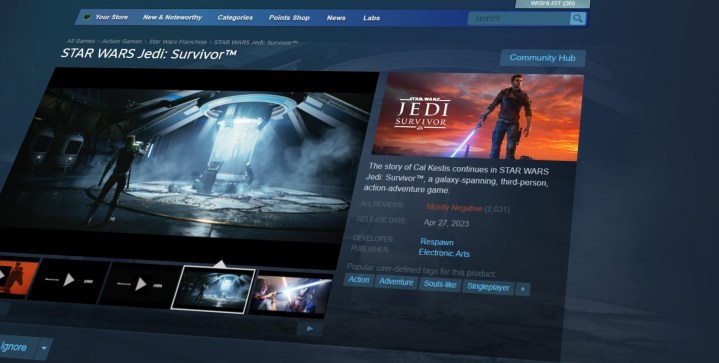Star Wars Jedi: Survivor is off to a bad start. The game launched to Mostly Negative reviews on Steam, with only 34% of the over 2,000 reviews being positive. That’s around the same level as the disastrous The Last of Us Part One PC port released in March, and it’s for the same reason: poor performance.
As pre-release footage showed, the game struggles to maintain a consistent frame rate even on a system equipped with an RTX 4090. Steam reviews claim frame rates around 30 frames per second (fps) at 1440p with an RTX 3090, and many are saying the game consumes upwards of 19GB of video memory with ray tracing turned on.

Low performance, particularly with ray tracing turned on, seems to be the key issue in Star Wars Jedi: Survivor. The game includes AMD’s FidelityFX Super Resolution (FSR) 2, but the high VRAM requirements seem to be leading to crashes and stutters regardless of the upscaling feature.
Another common issue plaguing users is traversal stutter. Like the previous game, Star Wars Jedi: Fallen Order, Survivor is built with Unreal Engine 4. Going between areas, especially on a large planet like Koboh, results in a massive dip in frame rate while the game struggles to load in new assets.
In our Star Wars Jedi: Survivor review, we praised the game and the experience it offered on consoles, though noted the minor technical issues still present on the Xbox Series X and PlayStation 5 versions. The PC release only seems to amplify these problems.
We’ve been testing the early sections of the game with an RTX 4090 and Core i9-13900K and can confirm relatively low performance and consistent traversal stutter. We’ll need to continue testing the larger areas of the game to find out if the issues worsen as the game continues.
Developer Respawn promised a day-one patch to solve major issues, but it seems the team didn’t include some key optimizations. The developer is saying it plans to release patches that address bugs, improve performance, and add more accessibility features “in the weeks ahead.”
Cal’s newest journey in a galaxy far, far away has begun and we’re excited for you to experience it!
Our first patch will arrive on launch day across all platforms. In the weeks ahead, we’ll deploy patches that will:
– Fix bugs
– Improve performance
– Add more accessibility… pic.twitter.com/pUtyoGopP5— EA Star Wars (@EAStarWars) April 26, 2023
Since the onslaught of negative reviews, Respawn as issued a statement saying it will look into the state of the PC port:
A note from the Jedi Team on the PC version of Star Wars Jedi: Survivor pic.twitter.com/C3bp78VICr
— EA Star Wars (@EAStarWars) April 28, 2023
Unfortunately, Star Wars Jedi: Survivor isn’t an isolated incident. It joins a long list of games that have experienced performance issues on PC that have released this year, including Hogwarts Legacy, Returnal, and Resident Evil 4 Remake. The common thread between them all is crashes and stuttering due to high VRAM requirements.
This new wave of games has pushed VRAM requirements far above what we expected in years past, with some titles consuming 16GB or more with ray tracing turned on. That leads even high-end graphics cards like the RTX 4080 to struggle to maintain a consistent frame rate.
Short of simply having more VRAM on tap, this issue mainly falls in the developer’s lap to find ways to save on VRAM requirements or wind down the scope of the game. As it stands now, it’s hard to trust that most major PC releases will launch in a playable state, even on the most expensive PC money can buy.




